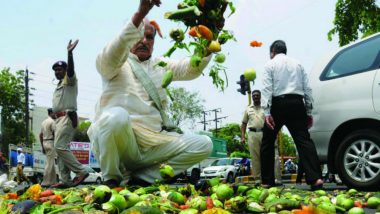Farmers on Friday launched a 10-day-long agitation as part of a nationwide strike to press for their demands, including waiver of loans and the right price for crops. Although the agitation has not affected normal life in the states so far, it is likely to hit the supply of essential items like milk and vegetables in the days to come. Here is a report of the impact of the strike on day one in different states.
Madhya Pradesh:
Talking to reporters in Bhopal, Rashtriya Kisan Mazdoor Mahasangh (RKMM) convenor Shivkumar Sharma announced that the farmers' agitation across 22 states, including Madhya Pradesh, has begun.
We have decided to observe a Bharat Bandh on June 10 till 2 pm. Would like to request all the businessmen of cities to close their shops till 2 pm & pay tribute to farmers who have lost their lives in previous years: Shiv Kumar Sharma, President, Rashtriya Kisan Mazdoor Mahasangh pic.twitter.com/oRtTRCVXkU
— ANI (@ANI) June 1, 2018
"The farmers' bodies have named the agitation as 'Gaon Bandh' (village blockade). The cultivators have been asked not to come to the markets in urban areas to sell their farm produce, including milk," he added.
On the last day of the protest on June 10, the farmers' bodies will orgainse 'Bharat Bandh', he said adding that the RKMM is one of the organisations involved in the agitation.
Mandsaur Superintendent of Police (SP) Manoj Kumar Singh told PTI over phone that so far there is no shortage of vegetables and milk in the district as all the markets are open.
The police have kept a close vigil in Mandsaur, where six farmers were killed in police firing during the farmers' agitation on June 6 last year.
Neemuch, the adjoining district of Mandsaur, also has not witnessed any shortage of vegetables and milk although the markets are shut there.
However, no farmer came to the grain market in Neemuch to sell his produce.
The Mandsaur SP said no untoward incident has been reported in the district so far. "Five companies of the Special Armed Force (SAF) of MP police are keeping a vigil across the district," he said.
West Bengal:
Farmers in West Bengal did not join the 10-day agitation launched by farmer organisations in several northern states to press their demands including loan waiver and right price for their produce .
The protesters have called 10-boycott of mandis or wholesale markets in Punjab, Haryana, Uttar Pradesh and Madhya Pradesh, triggering fears of shortage of food products and price rise.
Uttar Pradesh:
Several farmers in Uttar Pradesh's Sambhal district today stopped the supply of vegetables, milk and other items as part of the 10-day nationwide protest to press for their demands, including waiver of loans and the right price for crops.
"The farmers will not be selling milk, vegetables and grains in the urban areas from June 1 to June 10 as milk and tomato are being sold at very low rates," Sanjiv Tyagi from the Bharatiya Kisan Union said while addressing a panchayat in Bhadraula village.
"They are also not getting proper price for sugarcane. We also demand that the farmers should get 50 per cent profit on the cost incurred on crops by them," he said.
Meanwhile, the Rashtriya Kisan Manch (a farmers' outfit) has distanced itself from the bandh call.
"There was no response of the bandh call in Lucknow and adjoining districts. We are of the view that there is no point in telling the farmers to throw their agriculture produce on the streets, as they had put in their labour and hard work to produce the crops," Shekhar Dixit, the president of the Rashtriya Kisan Manch told a news agency.
"If the the farmers' condition are to be improved, then I would urge the farmers not to sow seeds of any grain or crop. This will also help the farmers in avoiding losses, and also registering their protests," he added.
Punjab:
In Punjab, farmers spilled milk on the road as a sign of protest:
Punjab: Farmers spill milk on the road during their 10 days 'Kisan Avkash' protest, in Ludhiana's Samrala (Earlier visuals) pic.twitter.com/rh7Fp5uVnl
— ANI (@ANI) June 1, 2018
Farmers in Faridkot held up supplies of vegetables and fruits.
Punjab: Farmers in Faridkot hold back supplies like vegetable, fruits and milk from being supplied to cities, demanding farmer loan waiver and implementation of Swaminathan commission (Earlier visuals) pic.twitter.com/P4Zl0Y8lX1
— ANI (@ANI) June 1, 2018
Amid ongoing farmers' protest in several states, Agriculture Secretary S K Pattanayak said many of their issues are local in nature and the Centre will take it up with respective state governments.
Asked about the ongoing protest, Pattanayak said, "Many issues are local in nature, which need to be tackled locally. We will take it up with the respective state governments."
He said that his ministry will definitely look into the issues which required to be addressed by the central government.
"So far, we have not received any representation (protesting farmers' bodies). Media is highlighting. We are conscious of it and we are sensitive to the needs of the farmers," he added.













 Quickly
Quickly


